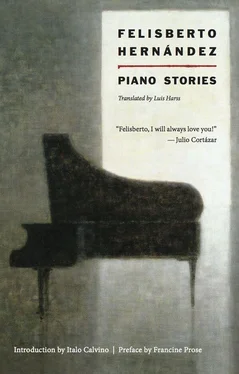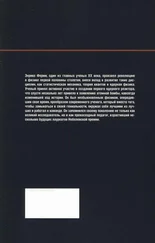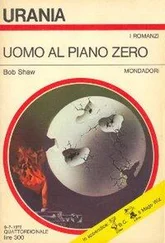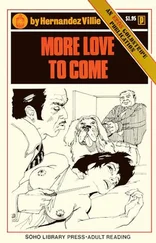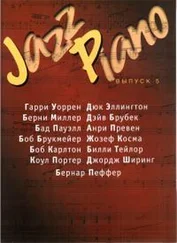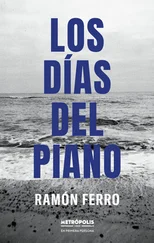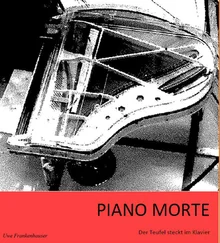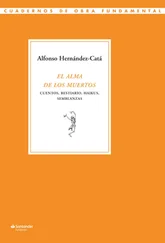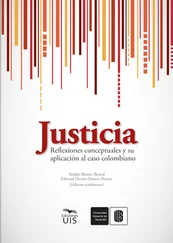Felisberto Hernandez - Piano Stories
Здесь есть возможность читать онлайн «Felisberto Hernandez - Piano Stories» весь текст электронной книги совершенно бесплатно (целиком полную версию без сокращений). В некоторых случаях можно слушать аудио, скачать через торрент в формате fb2 и присутствует краткое содержание. Год выпуска: 2014, Издательство: New Directions, Жанр: Современная проза, на английском языке. Описание произведения, (предисловие) а так же отзывы посетителей доступны на портале библиотеки ЛибКат.
- Название:Piano Stories
- Автор:
- Издательство:New Directions
- Жанр:
- Год:2014
- ISBN:нет данных
- Рейтинг книги:4 / 5. Голосов: 1
-
Избранное:Добавить в избранное
- Отзывы:
-
Ваша оценка:
- 80
- 1
- 2
- 3
- 4
- 5
Piano Stories: краткое содержание, описание и аннотация
Предлагаем к чтению аннотацию, описание, краткое содержание или предисловие (зависит от того, что написал сам автор книги «Piano Stories»). Если вы не нашли необходимую информацию о книге — напишите в комментариях, мы постараемся отыскать её.
Piano Stories
Piano Stories — читать онлайн бесплатно полную книгу (весь текст) целиком
Ниже представлен текст книги, разбитый по страницам. Система сохранения места последней прочитанной страницы, позволяет с удобством читать онлайн бесплатно книгу «Piano Stories», без необходимости каждый раз заново искать на чём Вы остановились. Поставьте закладку, и сможете в любой момент перейти на страницу, на которой закончили чтение.
Интервал:
Закладка:
The sympathy uniting these various lineages that totally ignored each other, never exchanging so much as a look, hovered over them: it was the innocent sky under which they all breathed the same air. In addition to being in the same room, at about the same time, to rehearse their memories, they had something else in common: the measured pace provided by the spectator’s breathing. It was as if a single orchestra were playing for different ballets. But the spectator — me, in other words, just before I became someone else — sensed that the inhabitants of those memories, although directed by him and magically obedient to his every whim, were also capable of exercising a hidden but proud will of their own. It seemed as if on their way down the road in time between their first performance — when they were not yet memories — and now, they had run into someone who had turned them against me, and since then they had acquired a certain independence; and now, although they could not help being under my orders, they accomplished their mission in a distrustful silence. I could tell they weren’t fond of me, that they wouldn’t look at me and that, while resigned to the fate I was imposing on them, they did not even remember my appearance: if I had entered their sphere they probably would not have recognized me. In any case, their different mode of existence made it impossible for me to touch them, speak to them or be heard by them: I was condemned to being the person I now was, and if I tried to repeat those events they would never be the same. They were the events of another world and it would be useless to chase after them. But why couldn’t I be happy watching those events live in their world? Could it be that my breath clouded or harmed them now because I was sick in some way? Might those memories be like children with a sudden instinct to reject and despise their parents? Would I have to renounce those memories as a bad father disowns his children? Unfortunately, something of the sort was going on.
The room I now occupied also contained memories, but they had no innocent sky overhead nor the pride of belonging to some lineage: they were inevitably attached to a man “with his tail between his legs,” whose accomplices they had become. These memories did not arrive from distant places or know any ballet steps: they came from underground, loaded with remorse, and slithered around under a heavy sky, even during the brightest hours of the day.
The painful and confusing story of my life separates the child I was in the days of Celina from “the man with his tail between his legs.”
Some women have seen Celina’s child in the man while talking to him. I hadn’t known the child was visible in the man until the child himself noticed it and told me he was visible in me, and that the women were seeing him and not me. Moreover, he was the first to attract and seduce them. The man later seduced them by appealing to the child. The man learned deceit from the child — who had much to teach him in that area — and practiced it the way children do. But he did not take into account his remorse or the fact that, although he practiced his deceit only on a few persons, they would multiply in the events and memories that haunted him night and day: which was why, fleeing his remorse, he wanted to be let into the room that had once been his, where the inhabitants of Celina’s parlor were now gathered for their ceremony. And the sadness of being rejected and even totally ignored by those inhabitants increased when he remembered some of the persons he had deceived. The man had deceived them with the wiles of the child, but had then, in turn, been seduced by the child he had just used, when he had fallen in love with some of his victims. These were late loves become mythical or perverse with age — and that wasn’t the worst of it. Worse still was the fact that the child had been able to attract and seduce the man he later became because his charms were more powerful than those of the man, and because life held more charm for him.
It was in the course of that same evening, when I discovered I had been shut out of the world of innocence and its ceremonies, that I started to become someone else.
First I had realized the inhabitants of that world did not look at me because I was on the other side of memory, the one where you carried a load of remorse on your back, as firmly attached as a camel’s hump. Then I realized the two sides of memory were like the two sides of my body: I would lie on one and then the other, changing my position, as if I were having trouble going to sleep and couldn’t predict which side luck would favor. But until I fell asleep I was at the mercy of my memories, like a spectator obliged to watch two very different companies perform without knowing what scene or which memories would light up first, how they would alternate, or what the relations between the actors would be, because the theater and producer were always the same, usually the same author was involved and the main characters were always a man and a child.
Then, when it was clear I couldn’t do without the spectacle that, although vague and confused in its mixture of times, had such a lasting effect on the life I had to go on living into the future — then I started to be someone else, to change the present and the road leading into the future, to become the pawnbroker with nothing left in his hands to weigh, and to try to suppress the space where the performances took place. I had let my feelings languish: I was tired of suffering from those memories that treated each other like irreconcilable enemies. And since I had no feelings, I’d stopped being sad over myself and even over the uselessness of a stage emptied of its memories. I had also become as useless as if I’d been left guarding a fortress without soldiers, weapons, or supplies.
All that remained was my habit of pacing about and watching the thoughts arrive. They were like animals that kept returning to drink from a spot where there was no more water. None of them was burdened with feelings: they could be as sad as they pleased, they were only thoughts. Now I let them come as if I were lying under a tree and leaves were falling on me: I would see them and remember them only because they had fallen and piled on me. My new memories would be like a bundle of clothes piled on my head: as I walked I would feel their weight there but nothing else. I was like that stray horse I had seen in the street as a child. Now I was pulling a cart anyone could load with things: I wouldn’t be taking them anywhere and I’d soon be tired.
That night, after lying in the bed for a while, I opened my eyes in the dark, which emptied them. But there were already skeletons of thoughts stirring — I don’t know what worms had eaten the flesh off their ribs and calves. Meantime I seemed to be slowly, lazily unfolding an umbrella with no canopy.
That was how I spent the hours when I was someone else. Then I fell asleep and dreamed I was in a huge cage, surrounded by people I had known as a child. There were also a lot of calves going through a gate to the slaughterhouse. Among the calves was a little girl who was also headed for slaughter. The little girl kept saying she didn’t want to go because she was tired, and the people were laughing at the innocent excuse she gave to escape death: they saw no point in worrying over something you couldn’t get out of.
When I woke up I realized I had also seen the little girl in the dream as a calf. It was the feeling I’d had, as if her human appearance had been only a variation in form: that she was a calf and expected to be treated as such. Yet I’d been moved when she said she didn’t want to go because she was tired — and my face was bathed in tears.
The tide of anguish sweeping over me during my dream had almost drowned me. But now it was as if I had been thrown out on a beach where I felt a great relief. My sense of well-being increased as my thoughts became receptive to my feelings again and I gradually recovered myself. Not only was I no longer someone else but I was more attuned than ever to what I felt: the least thought, even the idea of a jug of water, affected me deeply. I loved my shoes standing there alone, unlaced, always so fondly side by side. I felt capable of forgiving everything — and of being forgiven, even by remorse.
Читать дальшеИнтервал:
Закладка:
Похожие книги на «Piano Stories»
Представляем Вашему вниманию похожие книги на «Piano Stories» списком для выбора. Мы отобрали схожую по названию и смыслу литературу в надежде предоставить читателям больше вариантов отыскать новые, интересные, ещё непрочитанные произведения.
Обсуждение, отзывы о книге «Piano Stories» и просто собственные мнения читателей. Оставьте ваши комментарии, напишите, что Вы думаете о произведении, его смысле или главных героях. Укажите что конкретно понравилось, а что нет, и почему Вы так считаете.
